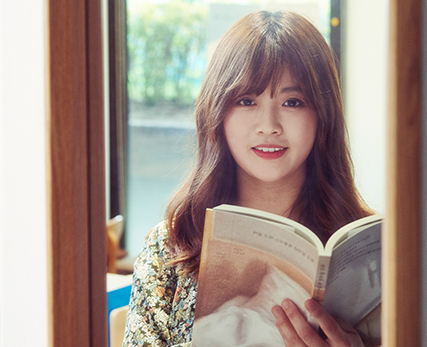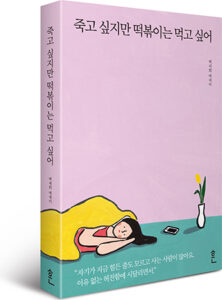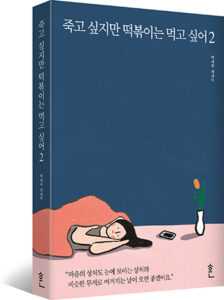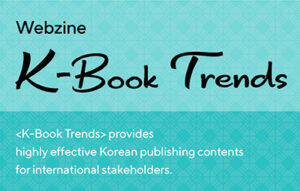Focus on Your Own Emotions
2020.08.03
Depression and anxiety are not easily tolerated emotions in our society. Maybe that is why depressed and anxious people have to ceaselessly doubt themselves about their feelings and care what others would think about them. It somehow seems <I Want to Die but I Also Want to Eat Tteokppokki> written by writer Baek Se-Hee is sending encouragement to all those people, whispering “I am just like you.”

Hello. Please introduce yourself to the subscribers of <K-Book Trends>.
Hello, everyone. I am Baek Se-Hee. I am just an ordinary person who has been working at a publisher for 5 years, and love tteokpokki, books, writing, and Zoodasa, a streamer on Twitch TV. I published my first essay <I Want to Die but I Also Want to Eat Tteokppokki (Heun)> in June 2018, followed by <I Want to Die but I Also Want to Eat Tteokppokki 2 (Heun)>, <Love and Freedom (coauthor, Munhakdongne)>, and <Body Language (coauthor, Arte)>. It is my dream to love myself and books, and be a vegan.
The popularity of your book, <I Want to Die but I Also Want to Eat Tteokppokki> published in 2018, is seeing no signs of cooling. Was there a story that you wanted to tell readers?
Well, <I Want to Die but I Also Want to Eat Tteokppokki> is a record of the psychiatric consultation I had for 2 years from 2017 for dysthymia and anxiety disorder. I just wrote down the consultations I had with the psychiatric specialist in a dialogue style. I also added some of my opinions on the consultations in between them.
I wanted those that are feeling and living as I do to read the book and find relief that they are not alone. For those that are different from how I am, I wanted them to just think that “oh, there are these kind of people in the world.” Well, you know, depression is just another “illness” like other physical diseases. It’s just their mind that is ill. I hoped those alike me to not be embarrassed, hate, or ignore the dark and emotionally hard parts inside them. It may sound banal, but life is tough for everyone, and it is ultimately you that has to look after yourself in the end.
It is my dream to love books and myself.
Did you think that your independently published book would be so loved by readers? And what do you think that the readers found attractive about the book?
Even though independent publications were quite recognized by people, I thought it still more of a minor topic. So I had never imagined that my book would become a bestseller even at the moment of its official publication. Well, I think the most important element is the title. I just made the title based on my experiences, but who knew? Readers really found empathy in them. There were even a pack of parodies such as “I want to die, but I want to have soju” or “I want to have gopchang (beef intestines).” Everyone encounters that tough moment in life, but your body instinctively gets hungry and craves delicious food. And the next important thing is that the book featured depression and that it was written like a dialogue from the viewpoint of an ordinary patient. Books of this type were all written in the words of psychiatrists before mine.


<I Want to Die but I Also Want to Eat Tteokppokki 1, 2>
<I Want to Die but I Also Want to Eat Tteokppokki 2> was published last year. Is there a particular phrase from volume 1 and 2 that you especially melted your heart in and would like to share with it our readers?
There is a phrase in the prologue of volume 1.
“A belief that today might not be a perfect day, but a fine day. A belief that life is something where on a very depressing day, you may have that one trivial thing that gives you great laughter. I realized that opening the dark part in my heart was a very natural thing, just like showing the bright part of it.”
I wanted those like me to be relieved that they are not alone
after reading my book.
Your book was also made into a play. How was the play as the original author of the story?
I saw the play twice. During the first play, I could barely watch it as I was so embarrassed. I could manage to concentrate on the play on my second visit. Reading my story in letters and watching it as a play was different. It is like… somebody else is standing in my shoes. Somebody else is acting my story. It was awkward at first, but I felt some kind of new ease of emotions through my story in the form of play and was consoled by it. I could look at myself from the third person’s perspective. Inside my heart, I could whisper to myself in the face of another that “You did a great job.”
What are your plans or works to be announced in the future?
Essay <Anyway, Characters> and another essay featuring cats and dogs are scheduled to be published in the second half of this year.
If you could say one thing to readers with dysthymia and anxiety disorder, what would it be?
I believe that evaluating and suppressing yourself with the yardstick of the society and others is a very dangerous thing. My psychiatrist also said that YOU are the most exhausted and tired person when going through difficult times. Feeling this way is never a selfish act. There is no such thing as more and less when it comes to emotional tiredness. When I feel tired, I am tired, and when I feel depressed, I am depressed. I think you should never compare yourself with others. It is not just a matter of having depression. I want you to focus on your own emotions. I want you to accept how you are feeling as it is. So when you feel tired or depressed, just think, “Oh, I am tired,” “Oh, I am depressed.” Don’t think, “This is nothing to be tired of,” or “I should not be depressed with things I have.”
Organized by Hwang Jin-Ah
